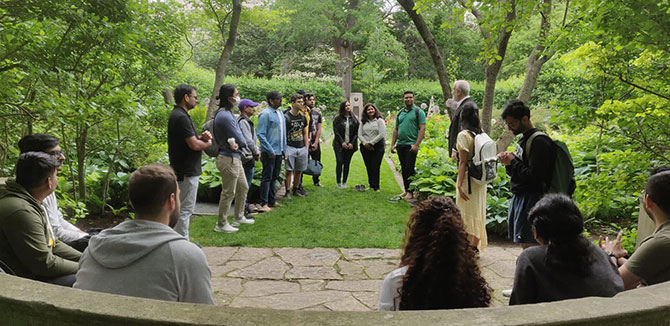Learning to Listen in the Shakespeare Garden
Kevin Murnane talked about his Leadership and Organizational Behavior course and why he invited students to spend a class sitting in one of the most beautiful settings on campus.
Hidden deep within the northern part of Northwestern University's campus is a secret garden more than a century old designed and dedicated to honor one of the world's most illustrious storytellers.
The Shakespeare Garden was planted in 1917 to honor the 300th anniversary of the Bard's death and in many ways mirrors traditional English gardens. For more than a century, the garden has played host to weddings, marriage proposals, and countless visitors looking for inspiration or simply relaxation.
Earlier this summer, the Shakespeare Garden was the source of a valuable lesson for students in Northwestern's Master of Engineering Management (MEM) program. It was in the garden where students in Leadership and Organizational Behavior came to understand the power of listening.
"Leadership is not what we do, but how we do it and who we are," said Kevin Murnane, who has taught the class the past two years. "The way I teach leadership is by focusing on awareness — slowing things down and allowing the students to really look at their values and who they are."
Murnane invited his students to have one of their final classes in the garden. The class started with a brief meditation — the way each session of Murnane's class begins — and it was during that moment of calm where Murnane saw the garden's effect on his students.
"People started to become noticeably relaxed, some people even took their shoes off," Murnane said. "And that was great. They began to feel comfortable in a way you can't in a classroom."
That comfort opened up an inspirational discussion about each student's values, and it turned into an honest conversation about who they were as individuals, what they wanted to accomplish, and perhaps most importantly, why they wanted to pursue that goal.
It created an awareness necessary to be an effective leader, Murnane said.
Awareness is the hallmark of Murnane's course, which begins with a detailed behavioral assessment for students to understand who they are, what they like, and where they get hung up with work. Leaders who understand their strengths and weaknesses are often the ones who make a difference, he said.
"Technical knowledge is only the key to the door as a leader," Murnane said.
To get through the door, Murnane said, leaders must understand how to get along with people, persuade others, create strategy, and build teams. To do that well, you need to know how you work well, and you need to be able to truly listen.
"One of the hardest parts of the class is building awareness of yourself," Murnane said, "and then working in teams about how to receive feedback from other people."
The ability to listen comes with self awareness, as Murnane demonstrates by explaining eight different types of listening, ranging from selfish listening to listening as if the other person has the answer. Selfish listening means a person listens to the extent of hearing what they want to hear to get their own way. Listening as if the other person has the answer requires a person to suspend their internal control and get out of the way so that the other person can take control of the conversation.
The awareness to have that ability does not come easy, Murnane said, but it can be taught. Having an inspiring garden as a backdrop definitely helps the process.
"Leadership is about making discerned choices, setting boundaries for yourself, and being deeply willing to understand where you get yourself in trouble," Murnane said. "What the garden did was it drove people to a deeper connection between mind, body, and spirit, however individuals define spirit."


